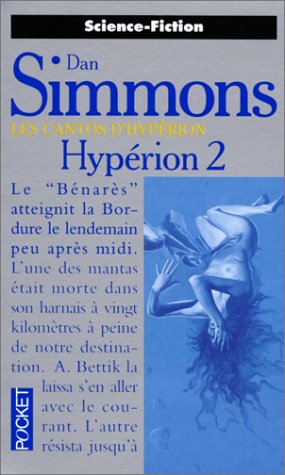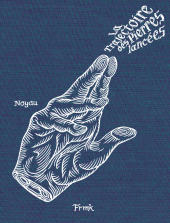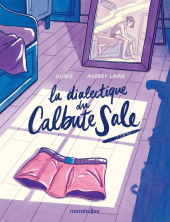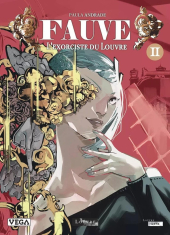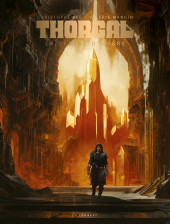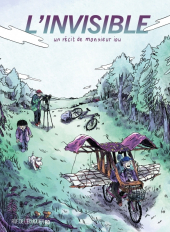Le début de
DuneA beginning is the time for taking the most delicate care that the balances are correct. This every sister of the Bene Gesserit knows. To begin your study of the life of Muad’Dib, then, take care that you first place him in his time: born in the 57th year of the Padishah Emperor, Shaddam IV. And take the most special care that you locate Muad’Dib in his place: the planet Arrakis. Do not be deceived by the fact that he was born on Caladan and lived his first fifteen years there. Arrakis, the planet known as Dune, is forever his place.
from “Manual of Muad’Dib” by the Princess Irulan
C'est peut-être mon début de bouquin préféré. Ca met dans le bain.
You have read that Muad’Dib had no playmates his own age on Caladan. The dangers were too great. But Muad’Dib did have wonderful companion-teachers. There was Gurney Halleck, the troubadour-?warrior. You will sing some of Gurney’s songs, as you read along in this book. There was Thufir Hawat, the old Mentat Master of Assassins, who struck fear even into the heart of the Padishah Emperor. There were Duncan Idaho, the Swordmaster of the Ginaz; Dr. Wellington Yueh, a name black in treachery but bright in knowledge; the Lady Jessica, who guided her son in the Bene Gesserit Way, and — of course — the Duke Leto, whose qualities as a father have long been overlooked.
from “A Child’s History of Muad’Dib” by the Princess Irulan
It is said that the Duke Leto blinded himself to the perils of Arrakis, that he walked heedlessly into the pit. Would it not be more likely to suggest he had lived so long in the presence of extreme danger he misjudged a change in its intensity? Or is it possible he deliberately sacrificed himself that his son might find a better life? All evidence indicates the Duke was a man not easily hoodwinked.
from “Muad’Dib: Family Commentaries” by the Princess Irulan
And it came to pass in the third year of the Desert War that Paul-Muad’Dib lay alone in the Cave of Birds beneath the kiswa hangings of an inner cell. And he lay as one dead, caught up in the revelation of the Water of Life, his being translated beyond the boundaries of time by the poison that gives life. Thus was the prophecy made true that the Lisan al-?Gaib might be both dead and alive.
“Collected Legends of Arrakis” by the Princess Irulan »
La première fois que j'ai lu Dune, j'ai fini par comprendre qu'en lisant avec attention ces petites phrases, tu peux comprendre ce qui s'est passé, ce qui se passe et ce qui se passera (voir ce qu'a dit Thyuig).
Y'a ça qui est cool aussi :
Muad’Dib could indeed, see the Future, but you must understand the limits of this power. Think of sight. You have eyes, yet cannot see without light. If you are on the floor of a valley, you cannot see beyond your valley. Just so, Muad’Dib could not always choose to look across the mysterious terrain. He tells us that a single obscure decision of prophecy, perhaps the choice of one word over another, could change the entire aspect of the future. He tells us “The vision of time is broad, but when you pass through it, time becomes a narrow door.” And always, he fought the temptation to choose a clear, safe course, warning “That path leads ever down into stagnation.”
-from “Arrakis Awakening” by the Princess Irulan
Ca amène à la conclusion : Paul n'est pas le Kwisatz Haderach.
Bref, c'est génial. Et quand on se fait chier à prendre toutes les citations, les classer par bouquin et tenter de leur donner un sens, ça ressemble à quelque chose. On l'avait fait avec une copine en prépa. Avant les liseuses, les epubs... On avait recopié à la main les textes, découpé, et fait un collage. Et vraiment, ça ressemble à quelque chose. Incomplet, mais tu sens que ça pourrait faire un livre (probablement chiant, mais qui a un sens).
Pour fanche : ce qui est ardu dans Dune, c'est le double sens permanent des dialogues. L'histoire est bateau (un Elu qui va mener son peuple vers la liberté en accomplissant des prophéties) mais la façon dont c'est raconté c'est plus que ce qui est raconté.
C'est Arrakis qui le dit.

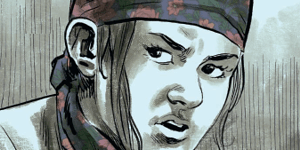




![effroi [affraid]](./images/smilies/affraid.gif)


